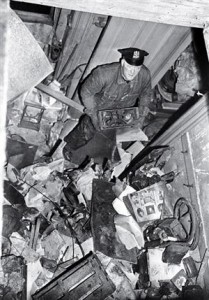previous
Related films and art
starting exploration
Thoughts and questions related to the essay “Edna’s List”
- Attached to the essay "Edna’s List"
Good advice about how to de-clutter
Posted November 25, 2011 6:30 pmJane Brody recently devoted her NY Times “Personal Health” column (Tuesday Science Section: 11/22/11) to the subject of ridding yourself of clutter. Her personal form of clutter seems to be unnecessary things bought on sale, while my own is anything that seems to embody family, friends, or moments from the past, though she does mention the memorabilia of her 42-year-old twin sons, which her late husband collected from the time the boys were in preschool. Brody was writing less about serious hoarding—of the type that gets you on reality TV—than about the kind we all do to one degree or another.

The Collyer Brothers became posterboys for hoarding in 1947 when their bodies were found buried in trash.
Her column was prompted by a new book, The Hoarder in You: How to Live a Happier, Healthier, Uncluttered Life, by psychologist Robin Zasio, which Brody writes is “about the best self-help work I’ve read in my 46 years as a health and science writer.” Quite a recommendation. Besides explaining the source of the problem, the book offers what sounds like sensible advice on how to overcome resistance and get yourself to discard what you don’t need. I’m getting the book. The fact that Brody thinks the subject is appropriate for a column on health definitely gives me pause. I’ve tended to think of my ever-expanding collection of personal relics as material poetry, but I am beginning to see it may have crossed the line into pathology.
I’ve forgotten who gave me what I think is the best bit of advice for my type of hoarding: if you want to discard something but can’t quite let go, take a photo of it. Having preserved an image of the object, you may find you no longer need the thing itself. Which brings me back to the art installation of Rachel Perry Welty: What at first seemed merely fascinating and insightful, has become an object of inspiration.
share
 site feed
site feed
What drives us to collect?
There is ample evidence that collecting is an inherited tendency. But sometimes there may be something in our personal history to explain why we collect ...
When "stuff" is good.
Gretchen Rubin made a case, in the August 19th Sunday NY Times, for good "stuff." She acknowledges that getting control over our accumulations gives you ...
Where does collecting end and hoarding begin?
I think Dr. Zasio (author of "The Hoarder in You") would acknowledge that even when a collection takes over a home, it doesn't slip into ...



eliz December 5, 2011 at 11:35 am
Joan and Carole, Just when you gave me the idea for a page of free collectables, a wonderful forward arrived via email: http://archive.elizwrites.com/?page_id=2104. How’s that for serendipity?
carole clark December 4, 2011 at 7:30 pm
I just stuffed an Alan Bilzarian shopping bag into my closet of bags
for conveying gifts as opposed to the other closet of bags for compost, garbage, wine…..
Beautiful sturdy bags should be passed along, recognized and valued.
Until the match is made they have to be saved.
Elizabeth Marcus December 2, 2011 at 12:04 pm
I LOVE this charming story! But who is to say that your hoard was not a true collection? Shopping bags are often beautifully designed objects, using sophisticated graphics, gorgeousness papers, and ingenious handles. (I have a weakness for them myself!) Maybe you could think of them as a revolving collection of free, usable art!
Joan Stein November 30, 2011 at 8:57 pm
My Achilles heel is shopping bags -Although I rationalize that I keep them so that I can reuse them to take a present to a friend, shoes to the shoemaker or my potluck lasagne to book club, the truth is that I become paralized at the thought of having to part with one for any useful purpose and obsess about which one to choose. I know that the source of this craziness is my mother, who had a mega-collection worthy of envy. Unfortunately, understanding this dynamic hasn’t helped a bit. When we moved from our big old house to a small apartment in the city I had to leave the premisis while my husband took the collection to a far away, undisclosed dump to prevent me from scavenging in the garbage to retrieve my beloved bags. The truth is that I have slowly and surrepticiously been restocking – hiding a bag here and a bag there in our tiny new digs, worrying that the incinerator down the hall is too close for comfort.